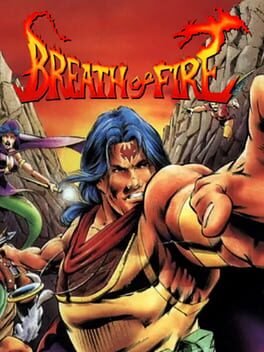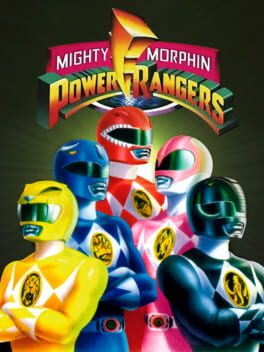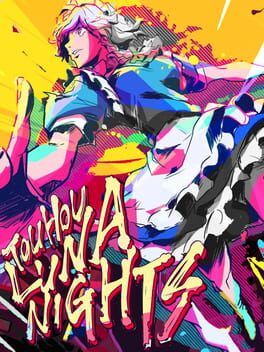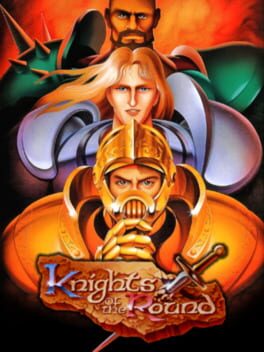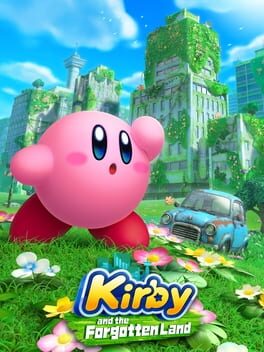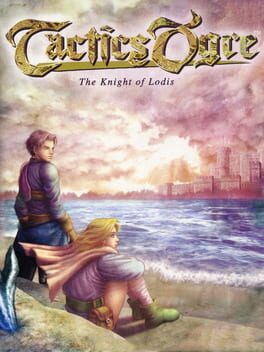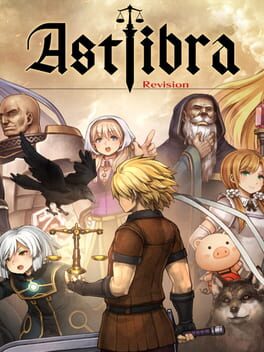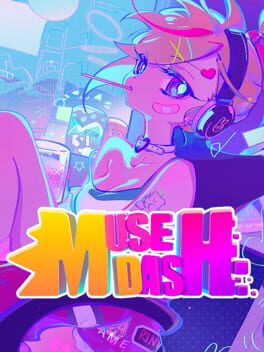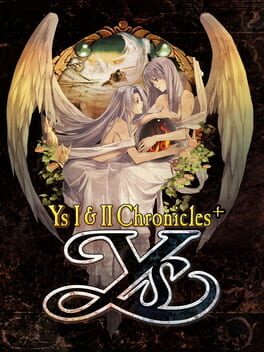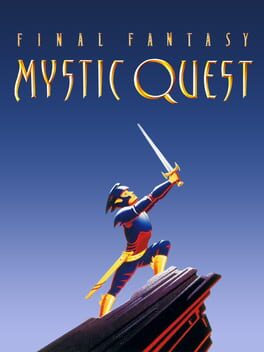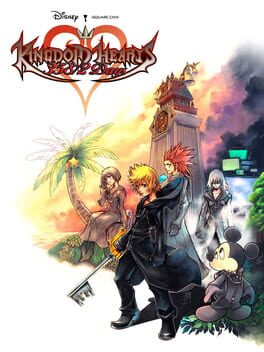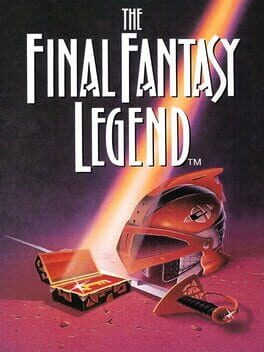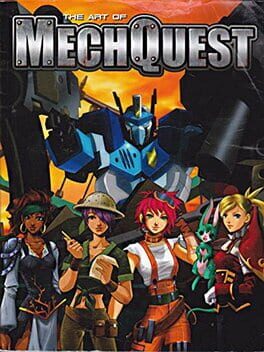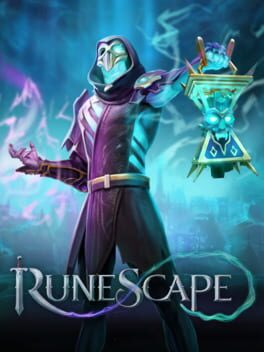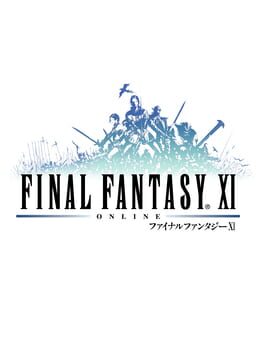moonhalo
1993
+ BGM is delightful, even filtered through the GBA MIDI decay.
+ surprisingly interactive overworld
+ sense of adventure
+ colorful and imaginative character design
+/- Characters have unique roles, which is pleasant, but some are substantially more useful than others.
+/- Enemy designs range from garden-variety to Lovecraftian. While the common enemies are pretty generic, some of the end game bosses are truly unnerving. Shout out in particular to Mote, whose design is cemented upon increasing/decreasing pixelization dependant upon the type of damage received. That was creative.
+/- Transformations are conceptually cool, but mechanically add very little.
- OK story utterly ruined by a pallid, lifeless script. The script is so poor it largely ruined the game for me. The original Dragon Warrior (NES) has a better script and by a huge margin, come on.
- characters are largely blank slates with very little diverging personality
- run-of-the-mill gameplay without any real substance; pales in comparison to even its SNES contemporaries
- despite the unique character roles, virtually every battle plays the same. Strategy is minimal even in the most difficult fights.
- absolutely brutal encounter rate that makes exploration and dungeons a real chore. I abused the hell out of the Marbl3 item just to make it tolerable, and that's just poor game design. Random battles are already a dated concept, but BoF's frequency is just ridiculous.
The terrible script and asinine encounter rate essentially killed the game for me. I pushed through to the end because I want to play the better-received BoF games, and consensus dictates they get progressively better, but I really wanted to drop it many times. Disregarding the mundane plot with a handful of cool ideas, lifeless characters, and decrepit gameplay, this game's death knell was walking around talking to all the various NPCs in the games' tiny villages to find almost all of them have the exact same lines of dialogue. In a genre that's deeply conditioned the player to interact with everything, holy shit was that excruciating.
+ surprisingly interactive overworld
+ sense of adventure
+ colorful and imaginative character design
+/- Characters have unique roles, which is pleasant, but some are substantially more useful than others.
+/- Enemy designs range from garden-variety to Lovecraftian. While the common enemies are pretty generic, some of the end game bosses are truly unnerving. Shout out in particular to Mote, whose design is cemented upon increasing/decreasing pixelization dependant upon the type of damage received. That was creative.
+/- Transformations are conceptually cool, but mechanically add very little.
- OK story utterly ruined by a pallid, lifeless script. The script is so poor it largely ruined the game for me. The original Dragon Warrior (NES) has a better script and by a huge margin, come on.
- characters are largely blank slates with very little diverging personality
- run-of-the-mill gameplay without any real substance; pales in comparison to even its SNES contemporaries
- despite the unique character roles, virtually every battle plays the same. Strategy is minimal even in the most difficult fights.
- absolutely brutal encounter rate that makes exploration and dungeons a real chore. I abused the hell out of the Marbl3 item just to make it tolerable, and that's just poor game design. Random battles are already a dated concept, but BoF's frequency is just ridiculous.
The terrible script and asinine encounter rate essentially killed the game for me. I pushed through to the end because I want to play the better-received BoF games, and consensus dictates they get progressively better, but I really wanted to drop it many times. Disregarding the mundane plot with a handful of cool ideas, lifeless characters, and decrepit gameplay, this game's death knell was walking around talking to all the various NPCs in the games' tiny villages to find almost all of them have the exact same lines of dialogue. In a genre that's deeply conditioned the player to interact with everything, holy shit was that excruciating.
I remember renting this from my local shoddy video game rental shack, the one that smelled vibrantly with pipe tobacco and dust, back in the late 90s. I was a wee lad then, I only got it for one weekend, and all I remember from it is how HYPE that soundtrack was
Revisiting it 20+ odd years later and this soundtrack still as hype as it ever was.
Revisiting it 20+ odd years later and this soundtrack still as hype as it ever was.
2019
The snappy runtime, unique Touhou aesthetic, timestop mechanic, bullet hell trim, and lean gameplay void of the superfluous, unnecessary combat bloat that make other Metroidvanias convoluted and tedious all congeal together to make this this indisputably the best Metroidvania I've ever played.
Thousand Knives is fucking broken, though.
Thousand Knives is fucking broken, though.
1991
I don't know, man. I don't know if its the hazy, distorted childhood memories playing this with my folks'; I don't know if it's the brilliantly medieval aesthetic; I don't know if it's the barebones RPG mechanic -- whatever it is, I've revisited this game more over the years than any other. I finally got my Retroid Pocket 3 setup yesterday after weeks of foaming at the mouth waiting for this juicy little retro-machine to come in the mail, and the first thing I did post-setup was pop on Knights of the Round and spend the next day save-scumming to get myself those equally juicy RetroAchivements. I learned things about this game I didn't even know from those countless replays every 2 to 4 years, like how grossly invaluable the parry mechanic is.
It's simple. It's streamlined. You can lie in bed and save-scum your way to level 14 and the Holy Grail and only eat 2 or 3 hours out of your increasingly invaluable day off. You get to chuckle at yourself playing as Percival imagining Arthur as Arturia while Percival (Shirou) monologues incoherently about how women shouldn't fight or whatever the fuck.
It's fun, it's frustrating, it's cozy, the level mechanic and parry system make it leagues ahead of its peers, and its style downright drips.
P.S. Fuck Bird Man and his blasted range.
It's simple. It's streamlined. You can lie in bed and save-scum your way to level 14 and the Holy Grail and only eat 2 or 3 hours out of your increasingly invaluable day off. You get to chuckle at yourself playing as Percival imagining Arthur as Arturia while Percival (Shirou) monologues incoherently about how women shouldn't fight or whatever the fuck.
It's fun, it's frustrating, it's cozy, the level mechanic and parry system make it leagues ahead of its peers, and its style downright drips.
P.S. Fuck Bird Man and his blasted range.
Kirby as directed by Tetsuya Nomura. The final boss hurls literal ass buildings at you while trying to fuse two worlds together, then you swallow a big rig and race across more collapsed buildings floating in the ruins of the cosmos to engage in a DBZ-style Kamehameha face-off against a straight-up Toriyama-looking alien.
It's delightfully refreshing at first, but by the midgame, you'll have seen just about everything it has to offer; by the end, it felt repetitive and I was ready for this to be done -- nevermind the postgame. But the scope and creativity made this a delightful change of pace from my typical trend of inhaling JRPGs.
It also deserves recognition for being both cozy and apocalyptic -- the European power metal to Nier Automata's DSBM.
It's delightfully refreshing at first, but by the midgame, you'll have seen just about everything it has to offer; by the end, it felt repetitive and I was ready for this to be done -- nevermind the postgame. But the scope and creativity made this a delightful change of pace from my typical trend of inhaling JRPGs.
It also deserves recognition for being both cozy and apocalyptic -- the European power metal to Nier Automata's DSBM.
This review contains spoilers
+/- It plays just like the Final Fantasy Tactics games, from the class system to the story presentation to the map to enemy units leveling with you. This is the sort of YMMV thing, but as a huge fan of the original Final Fantasy Tactics I enjoyed it.
+ Most classes are well balanced and virtually all of them are viable (and of the less viable ones, minus the Soldier, they can be optimised in such a way to take advantage of their niche uses), although I personally didn't play around with many of the demi-humans (which largely seem vaguely less viable). The physical classes and the mage classes are all unique enough to largely differentiate themselves, although there is obvious overlap. This allows for almost absolute freedom in playstyle. That the game isn't particularly challenging encourages that freedom.
- As a beginner, unraveling the ways class progression and the emblem system works is obtuse. It took quite a bit of dicking around and reading online before I grasped a full understanding of the class system.
+/- Emblems being used as a sort of in-game "achievement system" for passive character buffs and, especially, to unlock classes is a very cool idea. I'm not, conversely, a big fan of stat requirements being necessary to unlock classes. While it is logically sound, practically speaking, it's less intuitive and fun for me personally. I definitely prefer Final Fantasy Tactics' method of unlocking classes.
- Aside from the final boss, which is absurdly difficult in contrast to the rest of the game (although this is not a criticism; I really enjoyed the final battle), the game is disappointingly easy. You can approach most battles with the same units and same strategies you've been using across most other battles, and win without much difficulty. The only real challenge is in making sure none of your units die, because if they die and aren't revived by the end of battle; they're gone for good, and even that isn't particularly difficult. (Note: story development remembers which characters up to that point are and aren't alive, which is an interesting touch and very important to the nature of this game.) The only other exception is the siege at Formido where the player is required to split their troops, and that's only because I only had about one battle's worth (8 units) of adequately leveled and geared troops.
This is in large part due to the stupid, sincerely stupid AI, but the difficulty drop spurred by the stupid AI could've been curbed had the units been better equipped. Most enemy units simply aren't as threatening (in terms of equipped spells, largely, but also in weapons and armor) as the player's units can be should the player be taking advantage of the variety of weapons, armor, and spells available to him.
+/- Despite criticisms of the game's difficulty, the nature of this grid-based, tactics gameplay keeps it from becoming genuinely boring. There's always far more engagement than in traditionally easy "mash X to win" RPGs.
- Gameplay is slooooooow. I emulated this and found myself abusing the fast-forward feature, I think, during every single one of the enemy's turns, and often between my own characters' actions too. Games are largely much faster-paced nowadays, so it's... difficult to adjust to the slow movement speeds and animations of games like this.
+/- The nature of the overworld map is one of my few complaints with these Tactics games (the Final Fantasy Tactics series and these Tactics Ogre games too, seemingly), because there's no room for even the illusion of exploration and traveling the world, and it's one of the only design elements I feel is truly dated. While I like being able to press "select" to get a brief description of each of the game's locations, I never really feel like I'm traveling across vast regions of Ovis; the game is just telling me I am. That we literally only see environments in conversations and in battle is a large contributor to the problem. With that said, the environments are diverse and dynamic, and while the way the various environments impact gameplay is largely inconsequential, it goes a long ways towards fleshing out Ovis as a diverse and dynamic locale.
+ The narrative is the sort of intricate, moving political character drama with the sort of scale I loved about Final Fantasy Tactics (although I overwhelmingly prefer Tactics' story and characters) and hoped to get out of Final Fantasy XII. While the presentation occasionally feels hollow, especially how important characters die (by my hand) in battle and only have maybe one or two lines of monologue, one might make the argument this makes for a more realistic presentation than the overblown anime-style present in most JRPGs. And, of course, the narrative is slightly held back by the game's own platform: that is to say, it's difficult to tell an incredibly moving, engrossing story in a video game using character boxes with a few flourishes of dated, retrospectively LIDL visual effects.
Those are minor criticisms, because the story takes full advantage of its platform, and the tone much more strikingly resembles Final Fantasy Tactics than it does the more juvenile Final Fantasy Tactics Advance. While Yasumi Matsuno didn't direct this game (a disappointment I uncovered after I'd already started it; otherwise, I probably would've begun with Let Us Cling Together as my entry into the Ogre Battle franchise), the game is completely in tone with Matsuno's style of political tragedy.
+ I played route A, and I'm not sure how different narratively route B is aside from the ending; with that said, I watched the other endings through YouTube and they're all very well done.
Ending A I found particularly powerful in its tragic, vaguely open-ended conclusion. Alphonse waking up, presumably in Eleanor's old beach home, muttering Eleanor's name to himself was painful in a way I can sincerely relate to. I'm a huge sucker for this sort of romantic tragedy; it's agonizing, yet so resonatingly beautiful.
The way the A+ ending appears to connect to its sequel, Let Us Cling Together, is satisfying in a way that adds a brand new layer of depth to this game -- and I suspect I'll appreciate it even more once I've played LUCT. That the tribulations Alphonse underwent on Lodis shaped him into the character I suspect he becomes is one thing, but that his loss of Eleanor -- judging by the outcome of ending B -- is what really triggers this is truly saddening. And I love it.
+ Having two story routes and multiple endings is integral to the nature of this game and really makes me wonder what Final Fantasy XII would've been like had Yasumi Matsuno been able to finish it, knowing he initially sought that approach with it.
As a whole, Tactics Ogre: The Knight of Lodis consistently kept me engaged both in gameplay and plot, despite its flaws. Something about the mission-based style of game progression is incredibly addictive and kept me sinking far more hours into this game on a day-to-day level (I think I beat it over... a week, a week and a half, maybe? ) than I have any RPG in a long time.
The narrative isn't as dramatic, intricate, or powerful as Final Fantasy Tactics: The War of the Lions (the definitive version of FFT, after all), but very good on its own and I anticipate seeing in what ways it fleshes out the Ogre Battle lore, especially its connections to Tactics Ogre: Let Us Cling Together.
Character progression is less engaging than how I recall Final Fantasy Tactics (or even Tactics Advance), and there are definitely fewer classes which leads to fewer abilities and consequently, there is no "mix and match" aspect... but this is a criticism by comparison, because it's still super engaging as it is.
If there's a single complaint about this game, and I guess about the Tactics games in general really, it's that it's not very dynamic. You go to a mission, you battle, you observe a cutscene or event of some sort, you re-gear your characters with any new loot or upgrades you could afford in the shop, repeat. But perhaps it is because the loop is so basic it is so addictive.
P.S. Spot the weak title name:
- March of the Black Queen
- Let Us Cling Together (or: Wheel of Fate)
- Person of Lordly Caliber
- The Knight of Lodis
+ Most classes are well balanced and virtually all of them are viable (and of the less viable ones, minus the Soldier, they can be optimised in such a way to take advantage of their niche uses), although I personally didn't play around with many of the demi-humans (which largely seem vaguely less viable). The physical classes and the mage classes are all unique enough to largely differentiate themselves, although there is obvious overlap. This allows for almost absolute freedom in playstyle. That the game isn't particularly challenging encourages that freedom.
- As a beginner, unraveling the ways class progression and the emblem system works is obtuse. It took quite a bit of dicking around and reading online before I grasped a full understanding of the class system.
+/- Emblems being used as a sort of in-game "achievement system" for passive character buffs and, especially, to unlock classes is a very cool idea. I'm not, conversely, a big fan of stat requirements being necessary to unlock classes. While it is logically sound, practically speaking, it's less intuitive and fun for me personally. I definitely prefer Final Fantasy Tactics' method of unlocking classes.
- Aside from the final boss, which is absurdly difficult in contrast to the rest of the game (although this is not a criticism; I really enjoyed the final battle), the game is disappointingly easy. You can approach most battles with the same units and same strategies you've been using across most other battles, and win without much difficulty. The only real challenge is in making sure none of your units die, because if they die and aren't revived by the end of battle; they're gone for good, and even that isn't particularly difficult. (Note: story development remembers which characters up to that point are and aren't alive, which is an interesting touch and very important to the nature of this game.) The only other exception is the siege at Formido where the player is required to split their troops, and that's only because I only had about one battle's worth (8 units) of adequately leveled and geared troops.
This is in large part due to the stupid, sincerely stupid AI, but the difficulty drop spurred by the stupid AI could've been curbed had the units been better equipped. Most enemy units simply aren't as threatening (in terms of equipped spells, largely, but also in weapons and armor) as the player's units can be should the player be taking advantage of the variety of weapons, armor, and spells available to him.
+/- Despite criticisms of the game's difficulty, the nature of this grid-based, tactics gameplay keeps it from becoming genuinely boring. There's always far more engagement than in traditionally easy "mash X to win" RPGs.
- Gameplay is slooooooow. I emulated this and found myself abusing the fast-forward feature, I think, during every single one of the enemy's turns, and often between my own characters' actions too. Games are largely much faster-paced nowadays, so it's... difficult to adjust to the slow movement speeds and animations of games like this.
+/- The nature of the overworld map is one of my few complaints with these Tactics games (the Final Fantasy Tactics series and these Tactics Ogre games too, seemingly), because there's no room for even the illusion of exploration and traveling the world, and it's one of the only design elements I feel is truly dated. While I like being able to press "select" to get a brief description of each of the game's locations, I never really feel like I'm traveling across vast regions of Ovis; the game is just telling me I am. That we literally only see environments in conversations and in battle is a large contributor to the problem. With that said, the environments are diverse and dynamic, and while the way the various environments impact gameplay is largely inconsequential, it goes a long ways towards fleshing out Ovis as a diverse and dynamic locale.
+ The narrative is the sort of intricate, moving political character drama with the sort of scale I loved about Final Fantasy Tactics (although I overwhelmingly prefer Tactics' story and characters) and hoped to get out of Final Fantasy XII. While the presentation occasionally feels hollow, especially how important characters die (by my hand) in battle and only have maybe one or two lines of monologue, one might make the argument this makes for a more realistic presentation than the overblown anime-style present in most JRPGs. And, of course, the narrative is slightly held back by the game's own platform: that is to say, it's difficult to tell an incredibly moving, engrossing story in a video game using character boxes with a few flourishes of dated, retrospectively LIDL visual effects.
Those are minor criticisms, because the story takes full advantage of its platform, and the tone much more strikingly resembles Final Fantasy Tactics than it does the more juvenile Final Fantasy Tactics Advance. While Yasumi Matsuno didn't direct this game (a disappointment I uncovered after I'd already started it; otherwise, I probably would've begun with Let Us Cling Together as my entry into the Ogre Battle franchise), the game is completely in tone with Matsuno's style of political tragedy.
+ I played route A, and I'm not sure how different narratively route B is aside from the ending; with that said, I watched the other endings through YouTube and they're all very well done.
Ending A I found particularly powerful in its tragic, vaguely open-ended conclusion. Alphonse waking up, presumably in Eleanor's old beach home, muttering Eleanor's name to himself was painful in a way I can sincerely relate to. I'm a huge sucker for this sort of romantic tragedy; it's agonizing, yet so resonatingly beautiful.
The way the A+ ending appears to connect to its sequel, Let Us Cling Together, is satisfying in a way that adds a brand new layer of depth to this game -- and I suspect I'll appreciate it even more once I've played LUCT. That the tribulations Alphonse underwent on Lodis shaped him into the character I suspect he becomes is one thing, but that his loss of Eleanor -- judging by the outcome of ending B -- is what really triggers this is truly saddening. And I love it.
+ Having two story routes and multiple endings is integral to the nature of this game and really makes me wonder what Final Fantasy XII would've been like had Yasumi Matsuno been able to finish it, knowing he initially sought that approach with it.
As a whole, Tactics Ogre: The Knight of Lodis consistently kept me engaged both in gameplay and plot, despite its flaws. Something about the mission-based style of game progression is incredibly addictive and kept me sinking far more hours into this game on a day-to-day level (I think I beat it over... a week, a week and a half, maybe? ) than I have any RPG in a long time.
The narrative isn't as dramatic, intricate, or powerful as Final Fantasy Tactics: The War of the Lions (the definitive version of FFT, after all), but very good on its own and I anticipate seeing in what ways it fleshes out the Ogre Battle lore, especially its connections to Tactics Ogre: Let Us Cling Together.
Character progression is less engaging than how I recall Final Fantasy Tactics (or even Tactics Advance), and there are definitely fewer classes which leads to fewer abilities and consequently, there is no "mix and match" aspect... but this is a criticism by comparison, because it's still super engaging as it is.
If there's a single complaint about this game, and I guess about the Tactics games in general really, it's that it's not very dynamic. You go to a mission, you battle, you observe a cutscene or event of some sort, you re-gear your characters with any new loot or upgrades you could afford in the shop, repeat. But perhaps it is because the loop is so basic it is so addictive.
P.S. Spot the weak title name:
- March of the Black Queen
- Let Us Cling Together (or: Wheel of Fate)
- Person of Lordly Caliber
- The Knight of Lodis
2022
Do not forget: You are taking other people's treasure when protecting your own. If the Scale of Destiny favors a soul, it destroys the fate of another. Will you change this balance, or cast your eyes aside? Is it true that your choices bear no responsibilities? Is it true that you committed no crimes?
Do you ever know from the very moment a title screen hits you're about to play an all-time great? The PC-98 music hits, the moonlit background descends, and I knew instantly Astlibra was about to become one of my favorite games.
The story of Astlibra's development is effectively canonized by now: if you know about this game, you probably already know it's a 2D sidescrolling JRPG developed by one guy, KEIZO, for 16 years. From both a gameplay and narrative perspective, this makes Astlibra feel retro and modern simultaneously, and oh God does it show this is an indie project.
There's something to be said for the sheer freedom of expression allowed when one has absolute authority over their creative expression, especially in a culture like Japan routinely producing off-kilter ideas. Keizo is, like any good Japanese artist, fucking horny. You thought Takahashi was horny while directing Xenoblade 2? Nah, fam. Astlibra is plagued with scantily clad titty beasts. Plant monsters whose only censorship is her vines, floating bodies without appendages but no deficit of cleavage, goddesses whose battle armor is lingerie, individual boob physics on each breast, and a year's supply of juvenile sex humor you've seen in literally every ecchi you've ever watched. To really round off the sentiment, there's a traditionally JRPG colosseum-like arena with individual matches and one of those matches is titled "Harem" in which you have to slay every degenerate demon the game has ever thrown at you. Keizo is fucking horny.
Keizo is also, like any good Japanese artist, fucking extra. This man has read his fair share of visual novels, clearly loves time travel, and probably threw every idea he ever had over its development time at the wall and performed mad science to fuse it all together. This design philosophy extends to the gameplay for sure, but I'll come back to that later, because there's a phenomenal story here if you can make sense of it all.
Time travel is fascinating; even when it's riddled with plot holes it's gotta be one of my favorite genres. There's not a lot of "meaningful" choices in Astlibra, but there are choices, you can make the wrong ones, and you will feel the weight of them. There's VN-style epilogue-like "dead ends" (not always bad endings, necessarily). But most importantly, Astlibra's central theme is its opening tagline: life is a series of choices, and every time you make a choice to help someone, to save someone, you hurt or lose someone else. You could have the literal tools of God in your hands with the ability to correct any history you saw fit, but the butterfly effect unfolds -- what will you lose in the process?
Chapter 7 really struck an emotional chord with me, one that all-time greats like Fullmetal Alchemist (2003) and Mahou Shoujo Madoka Magica have, when the price of obsession was made manifest. What are you willing to sacrifice for your obsession? I watched a dry comedy-drama called Russian Doll last year, also a time travel story, and a certain character described something they termed a "Coney Island moment": your one past decision where everything went to hell. You made one catastrophic decision, however inconsequential it seemed at the time, tugging the lynchpin that kept your entire life together, and the butterfly effect surely unfolds. Astlibra's thesis is thus: if you could reverse time and undo the "Coney Island moment," sacrificing all the bonds and memories you made in the process, would you, and could you live with the consequences afterward? So many ideas are thrown into the story & lore it can be difficult to untangle, and yeah, I'm pretty sure it's riddled with plot holes (although I'll note that by the end it felt like every loose end was resolved), but if you can untangle the mess and bask in the distinctly Japanese zaniness, it packs some serious emotional weight.
If you choose one, you lose another. I made my choice by weighing my options on the Scales.
In a sense, the over-the-top design philosophy is infused into the gameplay nearly as much as the narrative. By the postgame there are four different progression systems, you unlock a wide variety of techs called "Karon," and I really have no idea how differently the game plays by experimenting with the many different build options because I fell into my rut around 25% through and brute forced my way to the end. I finished the game on hard, and it was fucking hard. My final clock time -- getting 100%, including achievements -- was 61.5 hours, and Steam registers a playtime of 95 hours. There's idle time in there for sure, but that demonstrates well over a dozen hours of lost progress because there is no autosave and trash mobs can fucking rip you a new one. By chapter 5 or so, it's entirely practical to be dying within 3 hits.
Combat is visceral; JRPGs normally make me sleepy, but the gameplay loop is fucking crack. You will be swarmed by fields of mobs as you hack 'n' slash your way through them, manipulating your iframes, guard gauge, cleverly hidden techniques, possession skills (the closest the game comes to a magic system), and Karon build to steamroll them as efficiently as possible. The gamepad rumbling in your hands with every slash, the frustration of playing what often feels like a 2D soulslike (or Metroidvania, the OG soulslike) where every input matters, dying, dying, and dying again to fucking trash. Every chapter has its own equipment section with materials dropped by mobs only found in that chapter, accompanied by a super streamlined and super rewarding crafting system, making it sinfully easy to blow 5 minutes grinding for a few more mats to purchase that next available weapon. The game rewards grinding almost too well. You can respec anytime you want, you chart a poorly implemented sphere grid, you grind your way into a veritable armory, wherein mastering each piece of equipment unlocks new Karon abilities or unlocks more magic crystals, necessary to actually equip Karon abilities, and you will never have enough magic crystals to equip more than 10-15% of your available Karon abilities at any given time, allowing plenty of room for experimentation.
The game's biggest flaw is how it reeks of early-to-mid 00s development. The gameplay loop is simple. The shitty ESL translation steals heavily from American idioms, like "using the John," in ways that just make zero sense within the setting's context, yet it's nonetheless nostalgic to a time of mediocre VN translations (Tohsaka's anus is defenseless), shitty anime subs, and downloading new episodes on BitTorrent then burning them to your DVD while posting screenshots of your ripped DVD collections on fan forums. The puzzles and platforming are excruciatingly retro; satisfying in their own way, but to solve them you have to think about them from a design perspective of a different era. You literally walk through glitches in the scenery to solve puzzles. Secret treasures in the game are well hidden in fucking pixel-sized green arrows, in the late game behind scenery, obstacles, and other hurdles making them, frankly, impossible to find unless you have a treasure guide up, and I absolutely recommend one to the side while playing. It's borderline cozy how there are virtually zero guides available online because it's so niche and playing it draws you into a real community; but there is a treasure guide, you should use it, and expect that otherwise, you will probably have to figure shit out on your own.
The art design is quirky yet charming, drenched in effects, 2D sprites slapped on backgrounds that are essentially two images photoshopped together exacerbated by its stiff animation. I adore the music. It is again something one should treasure through discovery, but the PC-98 aesthetic drenches this game artistically, and there's not a single bad track.
Really, everything comes into harmony to produce a grossly addictive game as I was propelled from literally the first 30 minutes to see the plot unfold, yearning to see the story's earliest and most harrowing mysteries resolved -- in most cases, far differently than I could have ever imagined. Right up until the postgame.
The postgame is effectively a sequel slapped on top of the base game; you think the bulk of plotlines are resolved, you think you've unlocked and done everything, and not only does the game implement MORE new mechanics with a Diablo-like loot system literally 45 hours into the game, but the story resoundingly emphasizes things are not yet over with a new mystery that completely curtails your ability to accept the game's "proper" ending as it is. And oh boy, the postgame is fucking fun, but everything falls apart.
It's best to go into this relatively blind, but I have a lot to rant about here. I won't spoil anything in detail but skip this paragraph if you don't want any expectations skewed.
--
The riveting difficulty gets tossed out the window as the game throws a new layer of possession skills that essentially trivialize every encounter you'll face until arguably the final-final boss (who still wasn't a fragment as difficult as the game's two "proper" final bosses), and the story almost literally deus ex machinas into oblivion every theme it spent its entire length establishing for the sake of conclusion. This game had a theme, goddamn it, and an excellent one at that. And the worst part about it is that I'm not even that mad, because the method by which it does so is, although tropey, so fucking cool it plays right into one of my favorite narrative structures. While the entire premise gets massacred in the process, it's done in a way that contextually makes sense (if you can look over how bloody extra everything is). But Astlibra's thesis carried so much emotional weight that seeing it discarded for the sake of worldbuilding and resolution is painful. By all rights, the proper ending is satisfying enough for a certain kind of crowd -- my kind -- and the postgame is just a postgame, however beefy it is. Can I reject the unfolding events as noncanon? Hard to say.
--
Struggling to regain what I lost made me lose everything else.
It's rare these days I can play a game and not levy a dumptruck load's complaints at it; I'm aging and I have a lot to bitch about it. A game's worth isn't so much defined by its flaws as it is how much its draws transcend those flaws. Astlibra is a gem. It's uniquely its own, there's so much to digest, and its creative expression is something you can really only get out of a game developed by one KEIZO for 16 years. The sort of poetic beauty to it all: the slice-of-life adventure of handling a new town's dilemmas every chapter; your guild master opening each chapter with a spine-tingling, heartrending summary of whose woes you must resolve; to see a VN-style opening theme at the end of EVERY FUCKING CHAPTER; all in a spacetime transcending romantic epic in pursuit of your first love. It's quirky, it's convoluted in a way only a JRPG could be, and it's beautiful. Go, my minions!
Do you ever know from the very moment a title screen hits you're about to play an all-time great? The PC-98 music hits, the moonlit background descends, and I knew instantly Astlibra was about to become one of my favorite games.
The story of Astlibra's development is effectively canonized by now: if you know about this game, you probably already know it's a 2D sidescrolling JRPG developed by one guy, KEIZO, for 16 years. From both a gameplay and narrative perspective, this makes Astlibra feel retro and modern simultaneously, and oh God does it show this is an indie project.
There's something to be said for the sheer freedom of expression allowed when one has absolute authority over their creative expression, especially in a culture like Japan routinely producing off-kilter ideas. Keizo is, like any good Japanese artist, fucking horny. You thought Takahashi was horny while directing Xenoblade 2? Nah, fam. Astlibra is plagued with scantily clad titty beasts. Plant monsters whose only censorship is her vines, floating bodies without appendages but no deficit of cleavage, goddesses whose battle armor is lingerie, individual boob physics on each breast, and a year's supply of juvenile sex humor you've seen in literally every ecchi you've ever watched. To really round off the sentiment, there's a traditionally JRPG colosseum-like arena with individual matches and one of those matches is titled "Harem" in which you have to slay every degenerate demon the game has ever thrown at you. Keizo is fucking horny.
Keizo is also, like any good Japanese artist, fucking extra. This man has read his fair share of visual novels, clearly loves time travel, and probably threw every idea he ever had over its development time at the wall and performed mad science to fuse it all together. This design philosophy extends to the gameplay for sure, but I'll come back to that later, because there's a phenomenal story here if you can make sense of it all.
Time travel is fascinating; even when it's riddled with plot holes it's gotta be one of my favorite genres. There's not a lot of "meaningful" choices in Astlibra, but there are choices, you can make the wrong ones, and you will feel the weight of them. There's VN-style epilogue-like "dead ends" (not always bad endings, necessarily). But most importantly, Astlibra's central theme is its opening tagline: life is a series of choices, and every time you make a choice to help someone, to save someone, you hurt or lose someone else. You could have the literal tools of God in your hands with the ability to correct any history you saw fit, but the butterfly effect unfolds -- what will you lose in the process?
Chapter 7 really struck an emotional chord with me, one that all-time greats like Fullmetal Alchemist (2003) and Mahou Shoujo Madoka Magica have, when the price of obsession was made manifest. What are you willing to sacrifice for your obsession? I watched a dry comedy-drama called Russian Doll last year, also a time travel story, and a certain character described something they termed a "Coney Island moment": your one past decision where everything went to hell. You made one catastrophic decision, however inconsequential it seemed at the time, tugging the lynchpin that kept your entire life together, and the butterfly effect surely unfolds. Astlibra's thesis is thus: if you could reverse time and undo the "Coney Island moment," sacrificing all the bonds and memories you made in the process, would you, and could you live with the consequences afterward? So many ideas are thrown into the story & lore it can be difficult to untangle, and yeah, I'm pretty sure it's riddled with plot holes (although I'll note that by the end it felt like every loose end was resolved), but if you can untangle the mess and bask in the distinctly Japanese zaniness, it packs some serious emotional weight.
If you choose one, you lose another. I made my choice by weighing my options on the Scales.
In a sense, the over-the-top design philosophy is infused into the gameplay nearly as much as the narrative. By the postgame there are four different progression systems, you unlock a wide variety of techs called "Karon," and I really have no idea how differently the game plays by experimenting with the many different build options because I fell into my rut around 25% through and brute forced my way to the end. I finished the game on hard, and it was fucking hard. My final clock time -- getting 100%, including achievements -- was 61.5 hours, and Steam registers a playtime of 95 hours. There's idle time in there for sure, but that demonstrates well over a dozen hours of lost progress because there is no autosave and trash mobs can fucking rip you a new one. By chapter 5 or so, it's entirely practical to be dying within 3 hits.
Combat is visceral; JRPGs normally make me sleepy, but the gameplay loop is fucking crack. You will be swarmed by fields of mobs as you hack 'n' slash your way through them, manipulating your iframes, guard gauge, cleverly hidden techniques, possession skills (the closest the game comes to a magic system), and Karon build to steamroll them as efficiently as possible. The gamepad rumbling in your hands with every slash, the frustration of playing what often feels like a 2D soulslike (or Metroidvania, the OG soulslike) where every input matters, dying, dying, and dying again to fucking trash. Every chapter has its own equipment section with materials dropped by mobs only found in that chapter, accompanied by a super streamlined and super rewarding crafting system, making it sinfully easy to blow 5 minutes grinding for a few more mats to purchase that next available weapon. The game rewards grinding almost too well. You can respec anytime you want, you chart a poorly implemented sphere grid, you grind your way into a veritable armory, wherein mastering each piece of equipment unlocks new Karon abilities or unlocks more magic crystals, necessary to actually equip Karon abilities, and you will never have enough magic crystals to equip more than 10-15% of your available Karon abilities at any given time, allowing plenty of room for experimentation.
The game's biggest flaw is how it reeks of early-to-mid 00s development. The gameplay loop is simple. The shitty ESL translation steals heavily from American idioms, like "using the John," in ways that just make zero sense within the setting's context, yet it's nonetheless nostalgic to a time of mediocre VN translations (Tohsaka's anus is defenseless), shitty anime subs, and downloading new episodes on BitTorrent then burning them to your DVD while posting screenshots of your ripped DVD collections on fan forums. The puzzles and platforming are excruciatingly retro; satisfying in their own way, but to solve them you have to think about them from a design perspective of a different era. You literally walk through glitches in the scenery to solve puzzles. Secret treasures in the game are well hidden in fucking pixel-sized green arrows, in the late game behind scenery, obstacles, and other hurdles making them, frankly, impossible to find unless you have a treasure guide up, and I absolutely recommend one to the side while playing. It's borderline cozy how there are virtually zero guides available online because it's so niche and playing it draws you into a real community; but there is a treasure guide, you should use it, and expect that otherwise, you will probably have to figure shit out on your own.
The art design is quirky yet charming, drenched in effects, 2D sprites slapped on backgrounds that are essentially two images photoshopped together exacerbated by its stiff animation. I adore the music. It is again something one should treasure through discovery, but the PC-98 aesthetic drenches this game artistically, and there's not a single bad track.
Really, everything comes into harmony to produce a grossly addictive game as I was propelled from literally the first 30 minutes to see the plot unfold, yearning to see the story's earliest and most harrowing mysteries resolved -- in most cases, far differently than I could have ever imagined. Right up until the postgame.
The postgame is effectively a sequel slapped on top of the base game; you think the bulk of plotlines are resolved, you think you've unlocked and done everything, and not only does the game implement MORE new mechanics with a Diablo-like loot system literally 45 hours into the game, but the story resoundingly emphasizes things are not yet over with a new mystery that completely curtails your ability to accept the game's "proper" ending as it is. And oh boy, the postgame is fucking fun, but everything falls apart.
It's best to go into this relatively blind, but I have a lot to rant about here. I won't spoil anything in detail but skip this paragraph if you don't want any expectations skewed.
--
The riveting difficulty gets tossed out the window as the game throws a new layer of possession skills that essentially trivialize every encounter you'll face until arguably the final-final boss (who still wasn't a fragment as difficult as the game's two "proper" final bosses), and the story almost literally deus ex machinas into oblivion every theme it spent its entire length establishing for the sake of conclusion. This game had a theme, goddamn it, and an excellent one at that. And the worst part about it is that I'm not even that mad, because the method by which it does so is, although tropey, so fucking cool it plays right into one of my favorite narrative structures. While the entire premise gets massacred in the process, it's done in a way that contextually makes sense (if you can look over how bloody extra everything is). But Astlibra's thesis carried so much emotional weight that seeing it discarded for the sake of worldbuilding and resolution is painful. By all rights, the proper ending is satisfying enough for a certain kind of crowd -- my kind -- and the postgame is just a postgame, however beefy it is. Can I reject the unfolding events as noncanon? Hard to say.
--
Struggling to regain what I lost made me lose everything else.
It's rare these days I can play a game and not levy a dumptruck load's complaints at it; I'm aging and I have a lot to bitch about it. A game's worth isn't so much defined by its flaws as it is how much its draws transcend those flaws. Astlibra is a gem. It's uniquely its own, there's so much to digest, and its creative expression is something you can really only get out of a game developed by one KEIZO for 16 years. The sort of poetic beauty to it all: the slice-of-life adventure of handling a new town's dilemmas every chapter; your guild master opening each chapter with a spine-tingling, heartrending summary of whose woes you must resolve; to see a VN-style opening theme at the end of EVERY FUCKING CHAPTER; all in a spacetime transcending romantic epic in pursuit of your first love. It's quirky, it's convoluted in a way only a JRPG could be, and it's beautiful. Go, my minions!
2018
In a genre drowning in 60-120 hour epics that can absolutely devour a working man's entire year, Ys I & II are a breath of fresh air. Each of these is a solid 2 session game -- 1 if you have a full day to commit to it -- finishable in 10 hours tops.
These were originally designed in the late 80s, so a guide is probably a must if you don't want to get lost because you didn't find the evil skull hidden behind a secret wall because the game doesn't completely convey what light magic does...
I appreciate how each game is divided into two arcs: arc 1 is a land-trotting adventure to gather information and tools to prepare you for arc 2, a dive into a massive, labyrinthian dungeon ripe with rooms, artifacts, and story. The final dungeons of each game are massive and half of the game. Darm Tower is so cool it got a full spin-off.
Ys II is probably a technical improvement on Ys I in nearly every way, and the review page reinforces that opinion, but I enjoyed Ys I more. These games are fun for the same reason the original Dragon Quest is fun: they predate the fusion of superfluous mechanics into a fatty genre. Ys I & II are lean, but Ys I more so. You bump into stuff and you win. That's the selling point. Ys II's introduction of a magic system conflicts with the bump system.
And while inventory, grinding, level design, and bosses are all technically an improvement, Ys I's dynamic locales, small-scale sense of adventure, and general aesthetic are more compelling. And that is, after all, an RPG's biggest selling point, no?
But as my introduction to the Ys series, these are fun. I look forward to how the series progresses.
These were originally designed in the late 80s, so a guide is probably a must if you don't want to get lost because you didn't find the evil skull hidden behind a secret wall because the game doesn't completely convey what light magic does...
I appreciate how each game is divided into two arcs: arc 1 is a land-trotting adventure to gather information and tools to prepare you for arc 2, a dive into a massive, labyrinthian dungeon ripe with rooms, artifacts, and story. The final dungeons of each game are massive and half of the game. Darm Tower is so cool it got a full spin-off.
Ys II is probably a technical improvement on Ys I in nearly every way, and the review page reinforces that opinion, but I enjoyed Ys I more. These games are fun for the same reason the original Dragon Quest is fun: they predate the fusion of superfluous mechanics into a fatty genre. Ys I & II are lean, but Ys I more so. You bump into stuff and you win. That's the selling point. Ys II's introduction of a magic system conflicts with the bump system.
And while inventory, grinding, level design, and bosses are all technically an improvement, Ys I's dynamic locales, small-scale sense of adventure, and general aesthetic are more compelling. And that is, after all, an RPG's biggest selling point, no?
But as my introduction to the Ys series, these are fun. I look forward to how the series progresses.
I'm currently listening to Benjamin Hoff's The Tao of Pooh and I had some pretentious monologue revved up about appreciating the simple things, but honestly, this game is garbage. It is the most braindead simple JRPG you'll ever play, punctuated by a host of frustrating mechanical decisions that twist the game from repetitive into frustrating. I hate that the player character is too weak to ever one-shot monsters the second party member always can. The overworld is a tedious, lifeless TRPG-esque map, so the meat of the game is a one-dimensional dungeon slog with sporadic villages and the most meaningless story beats woven through.
But man, I love that overworld. The artistic direction makes progressing through the game feel like more than it is.
Gameplay and story is shifted every time we move to a new primary location by a rotating cast of characters meant to lead you through new locales, and that establishes this weird sense of camaraderie and excitement that "something new" is around every corner. It makes me wonder that maybe a problem with modern JRPGs is distance, spending too much time with characters I once loved means I grow tired of them and take them for granted.
It's just cozy. I have frankly returned to this game more than any other Final Fantasy title. Yeah, it's so stupidly simple it should only appeal to people who don't play video games, but it's so chill it has a character all its own. Fun as hell to pick back up and binge for 4 or 5 hours while watching a new show -- or just to enjoy one of the best OSTs on the Super Nintendo and in the Final Fantasy franchise -- and shelve for another few years. There's an inexplicable charm to these simple, streamlined JRPGs -- the uncovered block.
But man, I love that overworld. The artistic direction makes progressing through the game feel like more than it is.
Gameplay and story is shifted every time we move to a new primary location by a rotating cast of characters meant to lead you through new locales, and that establishes this weird sense of camaraderie and excitement that "something new" is around every corner. It makes me wonder that maybe a problem with modern JRPGs is distance, spending too much time with characters I once loved means I grow tired of them and take them for granted.
It's just cozy. I have frankly returned to this game more than any other Final Fantasy title. Yeah, it's so stupidly simple it should only appeal to people who don't play video games, but it's so chill it has a character all its own. Fun as hell to pick back up and binge for 4 or 5 hours while watching a new show -- or just to enjoy one of the best OSTs on the Super Nintendo and in the Final Fantasy franchise -- and shelve for another few years. There's an inexplicable charm to these simple, streamlined JRPGs -- the uncovered block.
2007
2001
My very first MMORPG. Countless hours idling in Valkurm Dunes LFP, the first treacherous trek to Jeuno. Finally unlocking Dark Knight after countless hours of grinding.
I was, maybe, 15 years old, a late night somewhere around 11pm in 2008 and I finally found a party, a special thing in a game like FFXI. We partied for a while and my uncle just got off work at the UPRR; he'd swing by to use my PC just to check the Huskers website. I told my party what was going on and I'd be back as soon as I could. He was on there for three fucking hours; it was probably 2 or 3 in the morning by the time I returned. My party was still chilling, waiting on me, doing nothing because I was the tank and they needed me to pull.
Partying in Final Fantasy XI made special moments, made you feel important, and as much as I adore FFXIV and its phenomenal lore & story, nothing can ever replicate that feeling of community FFXI brought me in my formative years.
I never saw much of this game's story, if any at all, and didn't play much past finally unlocking DRK. And I know it's not the same experience I had in 2009; that style, that era of MMORPG is deceased. World of Warcraft killed it, and we'll never get it back. But I will one day return to Vana'diel and see everything it has to offer, to experience what FF veterans heralded as one of the finest stories in gaming well before they were making the same claims about FFXIV.
I know an MMORPG can't exist like this in today's culture, but I still wish a game could feel truly community-driven like this game did once upon a time.
I was, maybe, 15 years old, a late night somewhere around 11pm in 2008 and I finally found a party, a special thing in a game like FFXI. We partied for a while and my uncle just got off work at the UPRR; he'd swing by to use my PC just to check the Huskers website. I told my party what was going on and I'd be back as soon as I could. He was on there for three fucking hours; it was probably 2 or 3 in the morning by the time I returned. My party was still chilling, waiting on me, doing nothing because I was the tank and they needed me to pull.
Partying in Final Fantasy XI made special moments, made you feel important, and as much as I adore FFXIV and its phenomenal lore & story, nothing can ever replicate that feeling of community FFXI brought me in my formative years.
I never saw much of this game's story, if any at all, and didn't play much past finally unlocking DRK. And I know it's not the same experience I had in 2009; that style, that era of MMORPG is deceased. World of Warcraft killed it, and we'll never get it back. But I will one day return to Vana'diel and see everything it has to offer, to experience what FF veterans heralded as one of the finest stories in gaming well before they were making the same claims about FFXIV.
I know an MMORPG can't exist like this in today's culture, but I still wish a game could feel truly community-driven like this game did once upon a time.
